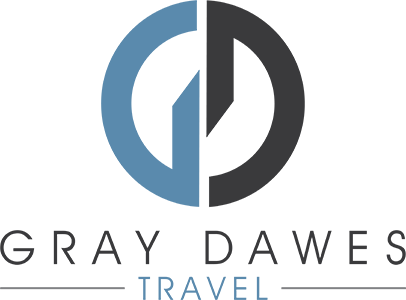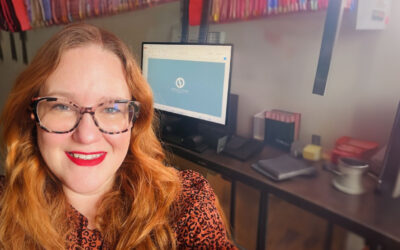WE CAUGHT UP WITH OUR DIVERSITY & INCLUSION MANAGER, BRIT CLAYTON
With a career in Equality, Diversity, and Inclusion (EDI) that began as a police investigator, Brit Clayton has plenty of stories to tell. From guiding EDI research for the British Psychological Society to raising awareness of conversion therapy at Pride, Brit has a genuine passion for her work and a love for helping people reach their full potential, regardless of age, ability, or way of working.
In this article, we chat with Brit about her day-to-day responsibilities as a Diversity & Inclusion Manager at Gray Dawes, her ultimate career highlights, and what it takes to work in the EDI industry.
Hi Brit. Tell us a bit about what a Diversity & Inclusion Manager does.
I work on Equality, Diversity and Inclusion (EDI) within the company and there are a lot of different components to the role. One side of the job that people don’t really think about is the compliancy side of things.
I’m primarily based in the UK where there is a lot of legislation regarding equality & diversity, not least the Equality Act 2010. A big part of my role is making sure that the company remains compliant with these various laws and amendments. I deliver a lot of training sessions to ensure that everyone within the company understands how an EDI-related law might affect the way a company works.
Recently, for example, there was a new amendment to the Equality Act 2010 which required us to arrange a series of Sexual Harassment training sessions in our UK offices.
Another side of my role is advising our business travel consultants on how to make travel better for clients with specific accessibility or well-being needs.
For example, if a traveller is deaf, are the staff at the hotel they are staying aware? If so, what’s the plan going to be if there’s a fire alarm? It’s thinking about fine details like that.
I also work closely with our Bids Team to ensure that they know what is going on in the wider world of EDI. A lot of RFPs (Request For Proposal) that we receive want to know what our EDI policies are and how we operate with them.
That leads me to another big part of what I do – finding EDI gaps in our working environment and writing policies to fill them.
Sometimes the policy is for the company as a whole. Other times it’s for staff and managers, mainly surrounding what kind of support they have available to them or that they need to provide.
I’ll also write EDI content for the website or offer my insights about business travel from an equality, diversity or inclusion angle. It’s one of the things I love about EDI – I get to branch out all across the business and deal with lots of different departments.
Equality, Diversity & Inclusion Statistics
%
employees across all generations said they prioritise EDI programmes when choosing a company to work for (73% for Gen Z).
%
the number of Fortune 500 companies with female CEOs, the highest ever.
%
the % Global GDP could increase by diversifying the world’s workforce
Tell us a bit about your career before coming to Gray Dawes.
EDI is quite an unusual industry – if we can even call it that – because there’s no real set path into it. Everyone tends to pivot from somewhere else. After I went to university, I started my career as an investigator, investigating the police. Quite strange really!
That role gave me a lot of transferable skills. While I was an investigator, I became Chair of the LGBT staff network, and I was part of the disability network too. Those roles brought me closer to EDI work, especially since I was working on investigations that were related to equality, diversity, and inclusion as well as doing community engagement work for specific groups.
I loved it. It made me realise what I wanted to do with my career. When I left, I got a job doing EDI work at a hospital before becoming an EDI consultant and trainer, going into companies and either fixing a problem or giving training around an EDI topic.
My last role before Gray Dawes was at the British Psychological Society. It was a more externally-focused role, as opposed to internal, HR stuff. I was tasked with making sure their industry was more open to people and to advise on specific areas of research.
Before I left, we were working on a project around unconscious bias and its psychological and scientific validity. It was really interesting work, but quite different to everything I’d done before.
Describe a typical work day in your role as a Diversity & Inclusion Manager.
What I tend to do when I first start my day is log on to check my emails, check my Teams messages, see what’s going on, and determine whether there’s anything anyone urgently needs help with.
For example, I’m doing a lot of sexual harassment training at the moment. So I might run a training course or host a talk. Sometimes I have to meet with a colleague to run through a project, as is the case with the recruitment project I’m putting together at the moment – I’ll spend time talking to managers who do a lot of recruitment to find out what works for them or what doesn’t.
It’s a varied day-to-day, which totally depends on what I’ve got on. Regardless of where I am or what I’m doing, I’ll always have a project going on in the background. So if I’m not in a meeting or having specific conversations about an EDI topic, I’ll be at work developing something.
How has your workday changed from the start of your career until now? How different is your role?
I think one of the best things about EDI (and also the biggest challenge) is that it’s constantly changing and evolving. New things crop up all of the time.
One of the topics that I’ve seen a big push towards recently is the menopause. There’s a lot of talk about how to make workplaces more menopause-friendly and ensuring that people have a better understanding of what it’s like to experience. After all, it’s something that 50% of us are going to go through at some point in our lives.
I think another thing that a lot of people struggle with is the language of EDI because it’s human nature. Language changes really quickly and a word someone might have been using, say, five years ago, might have already changed.
For example, the word “Asperger’s” has been a common term for a certain type of autism, but we’re now moving away from using it due to the controversial background of the person who initially coined the term.
There’s a particularly big language complexity concerning the labels we might use. A lot of people become accustomed to a certain label, particularly when it’s one that they’ve always been told is correct, and they can be quite resistant to changing it. I understand that.
When I run general EDI training sessions, I always get people saying that they don’t know what language to use as they don’t want to offend anyone.
I always say that if you know it’s a slur then obviously stay away entirely! But if somebody tells you “I don’t really like that word” then all you need to do is say “I’m sorry, thank you for letting me know,” and then move on.
Sometimes the worst thing you can do is continuously apologise because you feel bad when in reality it can make a situation worse.
New legislation gets imposed all of the time and we have to respond to it. Obviously, we don’t have any control over what that legislation says, so that can also create challenges. Like the sexual harassment law that’s recently been introduced. It was suddenly thrown in and I was like: “OK, so now I need to build a training package and then I need to deliver it otherwise we are not complying with the law.”
What is your favourite part of your role and do you have any specific career highlights?
I think my favourite part of the role is when I can visibly make something easier or better for an individual. There’s no better feeling than when somebody’s looking for advice and you have an answer that helps them.
For example, if somebody wants reasonable adjustments in the workplace I can help them find out more about their diagnosis and how it relates to work or give them a rundown of what the company can do to offer support. I’ll also look into things such as Government-run programmes that might be able to provide them with funding. Tangibly helping people like that, right in front of you, is always great.
In terms of career highlights, I did a piece of work which involved a quite high-profile investigation in the LGBT community about a serial killer in London. I got to work closely with the community and report on the failings of the investigation. That was a big highlight for me.
When I was at the British Psychological Society, we took part in a Pride march and spoke openly about ending conversion therapy. It’s something that should be easy to stop. But we still haven’t done it. So being able to walk around and shout about that in central London, bringing it more into the public arena, was a career highlight too.
What advice would you give people who want to break into the business travel industry or become a Diversity & Inclusion Manager?
Every single person I’ve ever met who works in EDI has a passion for it and I think that is the most important thing. This isn’t a job that you can just get into if you aren’t eager to learn about the differences that people have or how we can be more inclusive.
You might also want to focus on a niche. Do you know any protected characteristics that you might want to focus your work on? Perhaps you’re interested in supporting those with a disability because you or a family member has one. Or maybe you have a close connection to the LGBT community because you experienced bullying at school, as I did.
When you’ve had that kind of experience you’ll want to make sure that nobody else does. So working actively to end that, whether that be through volunteering or getting involved in bits and pieces at a workplace open to EDI input, is really beneficial.
If you want to get involved in EDI, you have to take initiative, get out there, and do stuff outside of your immediate job role.
It’s a bonus if you have a passion for a topic and can talk about it eloquently. For example, World AIDS Day is coming up and I want to do a presentation about the reality of HIV nowadays. There’s a lot of misinformation out there. You also have to always be open to the idea that you’re never going to know everything, and that every single day new things will come up.
Finally, a few quickfire questions…
Favourite place you have visited?
If we’re talking about the best experience, I’d probably say Iceland. I spent 5 weeks there with an Icelander, so I got a more introspective view of the country. Otherwise, I’d say America because of the sheer breadth of it. It has everything you want. If you want mountains, you’ve got it. You’ve got beaches, you’ve got cities, rural areas; whatever it is, America’s got it.
Any interesting hobbies or stories?
I go to football a lot. I’m a Manchester United fan and my local team is Sutton United. I go and watch them quite a lot. Non-league football is the best form of football because you don’t have the egos and the money, so it’s just a bit more free-flowing. I’ve also got a dog and I take him out for lots of walks and pamper him. I watch a lot of gigs and films as well. I’m really into the cinema again. I’m going to see Gladiator 2 soon and I’m really excited about it. I hope it’s better than Napoleon was. That was awful!
Favourite food and drink?
For drink, I’d probably go for a cherry Coke or a Dr Pepper. My favourite food is a really good veggie burger and chips because I’m a vegetarian. Patty and Bun do a really good plant-based burger.
Related Articles
BA Launches New British Airways Club
On 01 April 2025, BA are launching British Airways Club – a new loyalty programme that has been designed in response to the continually evolving “needs and reasons for travelling” of its fliers. In this article, we give a rundown of everything you need to know about the new scheme, including how to earn Tier Points.
A Day in the Life of a Global Bid Manager
With a career in bid writing that blossomed in the car rental and TMC space, Kelly Hills knows exactly what makes the travel industry tick. From preparing beautifully crafted bids to attending webinars and learning about the future of travel, Kelly has a genuine passion for her work and a love for writing. In this article, we chat with Kelly about her day-to-day responsibilities as a Global Bid Manager at Gray Dawes, her ultimate career highlights, and what it takes to work in the Bids team.
Manama: A Business Traveller’s Guide
Are you planning on travelling to Manama for work? In this comprehensive guide to Manama for business travellers, we delve deeper into navigating the city’s unique corporate landscape, offer our top tips for getting around, and pick out our top 3 things to see or do to make your trip unforgettable.
LET'S TALK
Fill in the form below and we'll get back to you as soon as we can.



